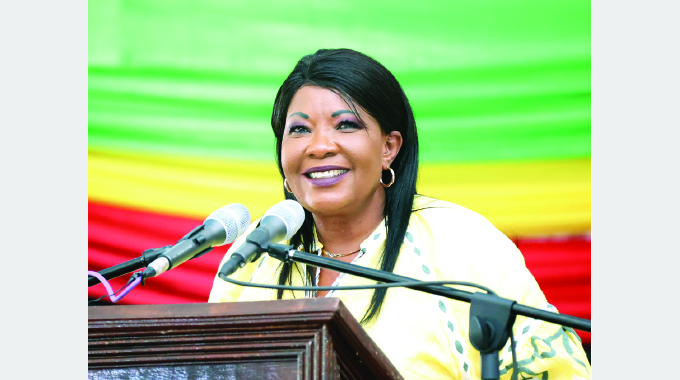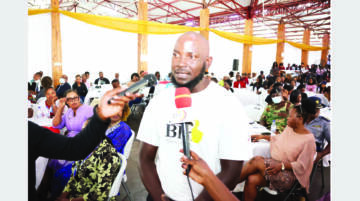First Lady bemoans GBV, sexual abuse in tertiary institutions

Tendai Rupapa in Gweru
FIRST Lady Dr Auxillia Mnangagwa has voiced concern over the disturbingly high prevalence of gender-based violence (GBV) and sexual harassment cases in tertiary education institutions.
Combating GBV, she said, had become a global priority and there were efforts and high-level commitments towards addressing the issue.
Dr Mnangagwa made the remarks yesterday while speaking as guest of honour at the official opening of the Midlands State University (MSU) Gender Institute Conference to tackle GBV and sexual abuse cases.
She also held an interactive session with students, lecturers and guests to the conference where they discussed many things including dressing, courtship, GBV and the need for learners to focus on their studies at the same time preserving their bodies.
The conference was held under the theme: “Combating gender-based violence in tertiary institutions of Zimbabwe: Tackling the root causes through policy advocacy and strategic approaches.”
The First Lady was invited to yesterday’s conference as a champion of the fight against gender-based violence in all its forms, sexual harassment and gender inequality.
She has thriving programmes like Nharirire Yemusha, Gota/Nhanga/Ixhiba and the male engagement which tackle GBV and sow the seeds of unity, peace and love in communities.

Delegates, university students and lecturers follow proceedings during an address and interactive session with First Lady Dr Auxillia Mnangagwa at the Gender Institute Conference at Midlands State University yesterday. – Pictures: John Manzongo
Prior to the proceedings, the First Lady acknowledged the support she gets in her philanthropic work from Midlands Provincial Affairs and Devolution Minister Senator Larry Mavima.
She also thanked MSU Vice Chancellor Professor Victor Muzvidziwa for inviting her.
The conference, Dr Mnangagwa said, would deliberate on strategic issues in tackling gender-based violence and sexual harassment in institutions of higher learning.
Both male and female students, the First Lady said, were affected.
“This is important because tertiary education institutions have increasingly turned out to be sites of extreme forms of gender-based violence. I recognise that while in most cases gender-based violence affects girls and women more than their male counterparts, boys and men have to a large extent become silent victims of gender based violence. Our approaches to combating gender based violence must therefore take into account this very important dynamic. I am reliably informed that most of the participants and presenters are from tertiary institutions in Zimbabwe and are therefore the closest to the solutions. It is therefore imperative that provocative conversations, dialogue and engagement between students, faculty thinkers and the community be a hallmark of this two-day conference on exploring the effects, impacts and implications of gender-based violence and sexual harassment in tertiary institutions.”
Discussions at the conference, the First Lady said, must capture the students’ voices based on their lived realities of gender-based violence and sexual harassment.
“I have often said that sexual violence should not be normalised and if we remain quiet on the role of perpetrators in tackling gender-based violence, we are doing a disservice to future generations. We need to bring the perpetrator into the picture in tackling gender-based violence and sexual harassment. We also need to do away with some of the myths which fuel gender-based violence; for example, the misplaced notion that victims of sexual abuse have themselves to blame. This can impact on how young women and men in tertiary institutions dress and how they use public spaces as well as their interactions in these spaces.”
The First Lady said violence in tertiary institutions manifested in many ways such as female students being forced into unprotected sex in sexual encounters with older men; being forced into drinking alcohol or ingesting drugs by older men during date outings after which they would be sexually assaulted; male students giving money or gifts to girls in exchange for sex.
When men “invested” in female students, the First Lady observed, they often resorted to violence if their partners refused to have sex with them or when they learnt that they had sex with someone else. Female students were forced to terminate unwanted pregnancies, which was often dangerous for their health and social status.
“Moreover, female students encounter multiple offers for ‘favours’ such as promises for good grades/marks in exchange for sex or sexual relationships. It is a noble move to break the silence surrounding gender-based violence and sexual harassment and I am pleased that this is the thrust of this inaugural conference. I have no doubt that this conference will help elucidate the causes and effects of gender based violence, how gender- based violence and sexual harassment can be minimised, and how we can counter the normative acceptance of the issue among young female and male students in tertiary institutions and the community at large.”

One of the male students expresses his views during an interactive session with First Lady Dr Auxillia Mnangagwa during the Gender Institute Conference at Midlands State University yesterday
“A violence free, gender responsive and inclusive Zimbabwe is possible if we join our hands and our minds to make this a lived reality.”
The country’s indigenous knowledge systems play in tackling gender-based violence.
“Very often, our traditional cultural beliefs and practices have been blamed for fuelling gender-based violence, at times rightly so, but let me assure this gathering that the real unmined gems are African concepts, ideas, values and ways of being and systems of knowledge that hold the keys to a society free from gender-based violence.
“This resonates very well with the growing number of related conversations and actions, one of which is the concept of nhanga/gota/ixhiba that has anchored the interventions that my foundation is making among the youths of our country. It is at such gatherings where we listen, talk, reflect, involve and engage our youths. Through the nhanga/gota/ixhiba concept our thrust has been and is to reorient young people on our cultural values and instill discipline and respect.”
As young people acquire formal education in schools, colleges, and universities, the First Lady said her Nhanga/Gota/Ixhiba Programme complemented the knowledge acquired by fostering respect and behaviour change.
“Our hope is that once young women and men enter tertiary institutions they are well equipped to deal with issues of sexual harassment and gender-based violence, and to be change makers. I wish to reiterate that the African family is vast; we have those who passed on, those who are living and countless who are yet to be born. We remember those who passed on as a result of gender-based violence. To the survivors, victims and perpetrators who are living and the unborn, my desire is that you live in an environment free from gender-based violence and sexual harassment. This resonates with the theme of the conference; to tackle gender-based violence and sexual harassment by influencing policy making,” she said.
During the interactive session, the mother of the nation expressed dismay that GBV was also affecting young children.
“How do we end this scourge which is affecting all ages and even children in Grade 3. Here at tertiary education level you are stressing one another. Parents would have sacrificed to send a child to university in the hope of making the child attain a certificate but they are coming back pregnant. This is a wound on a mother’s heart which won’t heal. Is it difficult to preserve yourselves as boys and girls?,” she asked.
The responses she got were many and varied with one female student saying: “Looking after oneself is not difficult Amai. As children, we should learn to appreciate what we would have been given by our parents and ignore blessers. One must understand what they came for to university.”
In another response, the student blamed it all on peer pressure.
“We will be fighting hard to preserve ourselves at university but peer pressure is getting the better of us. If you have never bedded a boy you are considered foolish and to avoid being called names you end up having sexual relationships.
Boys laid the blame on girls saying their female colleagues were the ones who were persuading them to be intimate.
“They call us for quality time in lodges and force us to buy niceties for them. Their love for things forces us to end up using even school fees,” said a male student.
In a separate response, a male student weighed in saying: “The way these girls dress is driving us crazy. These girls are walking semi nude and we fail to resist the temptation.”
The First Lady asked: “As a girl when you walk in the nude, what will be your aim? Do you know that your body is the temple of the Lord, hence you should respect your body?”
One female learner said summer time drove them to wear airy apparel.
“Our dressing has no problem. In summer we put on airy apparel. These boys must exercise self control. Even people wearing doeks and waist clothes are being raped, so it’s not about dressing,” she said.
A male student, however, refused to buy the explanation and insisted that girls should not dress provocatively.
“During exams you end up forgetting all you read after being affected by their dressing. Its now “Shama” (nude) university. They contribute to the change of our mindset. We all need to take part in making the world a better place,” he said.
Dr Mnangagwa said through her Nhanga/Gota/Ixhiba Programme she was striving to teach boys and girls how to dress well and behave well since they are the future leaders.
“You should dress how you want to be addressed. You want to be a daughter-in-law of whose household if you are known for dressing badly. Bad behaviour brings the name of your family, your community and the country into disrepute. Don’t forget you are an African, as Zimbabweans we have our culture that we must follow. As mothers-in-law we want respectful sons-in-law and daughters-in-law,” she said.
A boy said the way a child is treated at home affects their behaviour outside.

One of the students expresses her views on factors that contribute to gender based violence in tertiary institutions during an interactive session with First Lady Dr Auxillia Mnangagwa during the Gender Institute Conference at Midlands State University yesterday
“Amai the way we are treated at home contributes to our behaviour outside home. I think children who misbehave at school lack parental guidance at home,” he said.
The First Lady said it was at home where children are nurtured and they had to remain with the teachings even outside their homes since the future lies in their hands.
The First Lady spoke on courtship.
“You should not skip courtship stage so that you learn one another with your partner for atlist two years. We say no to those who get married and divorce in no time because they would not have learnt each other’s character. As students I want you to do good things so that if we award you a scholarship as Angel of Hope Foundation, you will not embarrass us there,” Dr Mnangagwa said.
A Lecturer at the university, Ms Adele Mcilo, thanked the First Lady for her time with the students.
“We are thankful to you for coming to talk with your children Amai. We are thankful for your Gota/Nhanga/Ixhiba programme which is helping mould children’s behaviour countrywide. This issue of sexual harassment is both sides to the learners and the lecturers. Some girls neither want to read nor write assignments and they offer lectures sexual favours. Some male lecturers complain about this during our meetings. Even male students are proposing love to female lecturers so that they get academic favours. We are grateful for your educative session which has taught us a lot. We hope our students have also learnt from your wisdom,” she said.
The First Lady spoke candidly against these allegations and encouraged the students to work hard in their studies and urged lecturers not to fall for the sexual advances by the students.
She urged the female students to form groups so that she, in partnership with the Ministry of Women Affairs, Gender and Community Development, can introduce projects for them so that they do not get swayed by blessers.
“You girls, protect your bodies and boys do the same and we focus on our studies,” she said.
Earlier, Sen Mavima had showered the First Lady with praises for the works she was doing countrywide, which had seen her being honoured by other countries.
“We are gathered here today in Gweru, the city of progress, as we host the gender institute conference on sexual harassment in institutions of higher learning here at the midlands university. Ladies and gentlemen, our First Lady Dr A Mnangagwa continues to work, support and advocate for issues that are close to her heart. Saving women from cervical cancer, protection of children, human rights and philanthropic work. Amai, the people in this hall today and those joining us virtually are men and women interested in gender equality and the eradication of sexual harassment not only in institutions of higher learning but also across the country. They come to work everyday with the fundamental goal of campaigning for gender equality in both rural and urban Zimbabwe. Your Excellency, you are indeed an inspiration to so many people not just for who you are and what you have done but for what you stand for and have achieved. This is evidenced by your conferment with a doctor of philosophy degree from the GD Goenka University of India,” he said.
Executive director of the MSU Gender Institute Professor Irene Muzvidziwa gave the conference’s objectives and projected outcomes.
“There are three main objectives that this conference is focusing on. To examine the main causes of sexual harassment in tertiary institutions, to examine the availability of reporting structures and their effectiveness for victims of sexual harassment within tertiary institutions. The third one is to advocate for gender policies that are not just gender sensitive but gender responsive. Policies that seek to promote zero tolerance to GBV in institutions of higher learning. The outcome for this conference, as gender conference we should be able to have a special issue on GBV published in our accredited journal and it is my hope that at the end of this conference we would have achieved the set objectives,” she said.
In her Vote of thanks, Professor Grace Mugumbate, said institutions of higher learning valued gender issues and would play a key role in promoting gender equality.
She said the university had been inspired, challenged and implored to introspect.









Comments